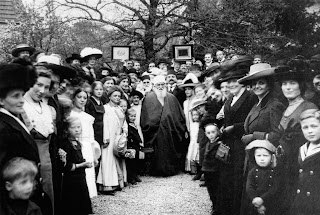 |
| The Bahá’ís: An exploration of the history, beliefs, and practices of the Bahá’í Faith A publication of the Bahá’í International Community |
Excerpted from The Bahá’ís
Religion in an ever-advancing civilization
 |
| The Bahá’ís: An exploration of the history, beliefs, and practices of the Bahá’í Faith A publication of the Bahá’í International Community |
Excerpted from The Bahá’ís
Religion in an ever-advancing civilization
 |
| The Bahá’ís: An exploration of the history, beliefs, and practices of the Bahá’í Faith A publication of the Bahá’í International Community |
Excerpted from The Bahá’ís
Religion in an ever-advancing civilization
 |
| The Bahá’ís: An exploration of the history, beliefs, and practices of the Bahá’í Faith A publication of the Bahá’í International Community |
 |
| Delegates to the 11th International Convention, Haifa, 2013 |
‘Abdu’l-Bahá explains: “That which was applicable to human needs during the early history of the race can neither meet nor satisfy the demands of this day, this period of newness and consummation.” He continues: “Man must now become imbued with new virtues and powers, new moral standards, new capacities…The gifts and blessings of the period of youth, although timely and sufficient during the adolescence of mankind, are now incapable of meeting the requirements of its maturity.”
The hallmark of this approaching age of maturity is the unification of the human race.
Shoghi Effendi writes that, while unity “of family, of tribe, of city-state, and nation have been successively attempted and fully established” world-encompassing unity is “the goal towards which a harassed humanity is striving.” In another passage, he refers to “the inauguration of a world civilization such as no mortal eye hath ever beheld or human mind conceived.” He asks: “Who is it that can imagine the lofty standard which such a civilization, as it unfolds itself, is destined to attain? Who can measure the heights to which human intelligence, liberated from its shackles, will soar? Who can visualize the realms which the human spirit, vitalized by the outpouring light of Bahá’u’lláh, shining in the plenitude of its glory, will discover?”
The emergence of a global civilization prosperous in both its material and spiritual dimensions implies that the spiritual and practical aspects of life are to advance together. Through faith and reason, it becomes possible to discover the powers and capacities latent in individuals and in humanity as a whole, and to work for the realization of these potentialities. Recognition of the fundamental harmony of science and religion also allows for the generation, application, and diffusion of spiritual and material knowledge among all the world’s inhabitants.
Bahá’u’lláh affirms: “The well-being of mankind, its peace and security, are unattainable unless and until its unity is firmly established.”
‘Abdu’l-Bahá The Promulgation of Universal Peace
Shoghi Effendi The Promised Day Is Come
Bahá’u’lláh Gleanings from the Writings of Bahá’u’lláh
 |
| ‘Abdu’l-Bahá - Stuttgart, Germany, 1913 |
"First, there are those which constitute essential, or spiritual, teachings of the Word of God. These are faith in God, the acquirement of the virtues which characterize perfect manhood, praiseworthy moralities, the acquisition of the bestowals and bounties emanating from the divine effulgences—in brief, the ordinances which concern the realm of morals and ethics. This is the fundamental aspect of the religion of God, and this is of the highest importance because knowledge of God is the fundamental requirement of man. ... This is the essential foundation of all the divine religions, the reality itself, common to all. ..."
"Second, there are laws and ordinances which are temporary and nonessential. These concern human transactions and relations. They are accidental and subject to change according to the exigencies of time and place."
‘Abdu’l-Bahá,The Promulgation of Universal Peace
www.bahai.org/r/830092706
 |
| Gardens at Bahjí |
"Whoso hath recognized the Dayspring of Divine guidance and entered His holy court hath drawn nigh unto God and attained His Presence...
Whoso hath failed to recognize Him will have condemned himself to the misery of remoteness, a remoteness which is naught but utter nothingness and the essence of the nethermost fire. Such will be his fate, though to outward seeming he may occupy the earth’s loftiest seats and be established upon its most exalted throne."
"He Who is the Dayspring of Truth is, no doubt, fully capable of rescuing from such remoteness wayward souls and of causing them to draw nigh unto His court and attain His Presence. “If God had pleased He had surely made all men one people.” His purpose, however, is to enable the pure in spirit and the detached in heart to ascend, by virtue of their own innate powers, unto the shores of the Most Great Ocean, that thereby they who seek the Beauty of the All-Glorious may be distinguished and separated from the wayward and perverse. Thus hath it been ordained by the all-glorious and resplendent Pen.…"
"That the Manifestations of Divine justice, the Daysprings of heavenly grace, have when they appeared amongst men always been destitute of all earthly dominion and shorn of the means of worldly ascendancy, should be attributed to this same principle of separation and distinction which animateth the Divine Purpose."
"Were the Eternal Essence to manifest all that is latent within Him, ...none would be found to question His power or repudiate His truth. Nay, all created things would be so dazzled and thunderstruck by the evidences of His light as to be reduced to utter nothingness."
Bahá’u’lláh, Gleaning
www.bahai.org/r/688768056
 |
| Entrance to the Shrine of the Báb |
‘Abdu’l-Bahá, Paris Talks
www.bahai.org/r/352527373
 |
| Bahá’í House of Worship, Chile |
Bahá’u’lláh, Tablets
www.bahai.org/r/694735299